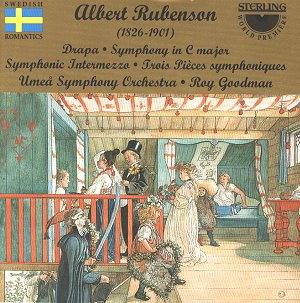
Sterling bring us another completely unknown Swedish romantic; this time
with Leipzig connections. His music is in delightful thrall to Schumann's
orchestral music although the latest work here also bears the marks of
Dvorák.
Without being utterly compelling Rubenson is an attractive voice for anyone
who loves the music of Berwald and Schumann.
Drapa is typically nationalistic with echoes of Smetana's heroism.
The predominant major voice and influence is Robert Schumann. The work is
also has episodes that evoke a village dance. The four movement symphony
reflects some of the great names of the nineteenth century. Beethoven's
Pastoral in the central movements and both Schumann (especially the
fourth symphony in the final allegro con fuoco) and Schubert (The
Unfinished) stalk the outer movements. The influences are obvious but
Rubenson has a fresh voice that makes his music transcend crass influence
spotting.
Symphonic Intermezzo (three movements) is again from the Schumann
stable with some wonderfully balanced juxtapositions of loud and soft. The
second movement is Weber-like in its woodland mystery with its classical
high-noon warmth rippled and ruffled by some elegant dashing breezes. The
final allegro non troppo reminded me of Schumann's Overture, Scherzo
and Finale although Joachim Raff can also be discerned among the brisk
romance.
The Three Symphonic Pieces, as befits their date, seems the most modern
work on the disc. Dvorák (of Symphonies 4-6), the unassuming countryman,
is a familiar voice in a work that seems to celebrate village dances and
rustic romance: Perhaps a flavour of Smetana's Bartered Bride also
hangs over the work. The last movement has a gentle valour returning to
Rubenson's 'magnetic North' reasserting the Schumann nexus.
Attractive and unassuming music with a smile and wink. Recommended.
Reviewer
Rob Barnett

see also earlier review by Ian Lace

